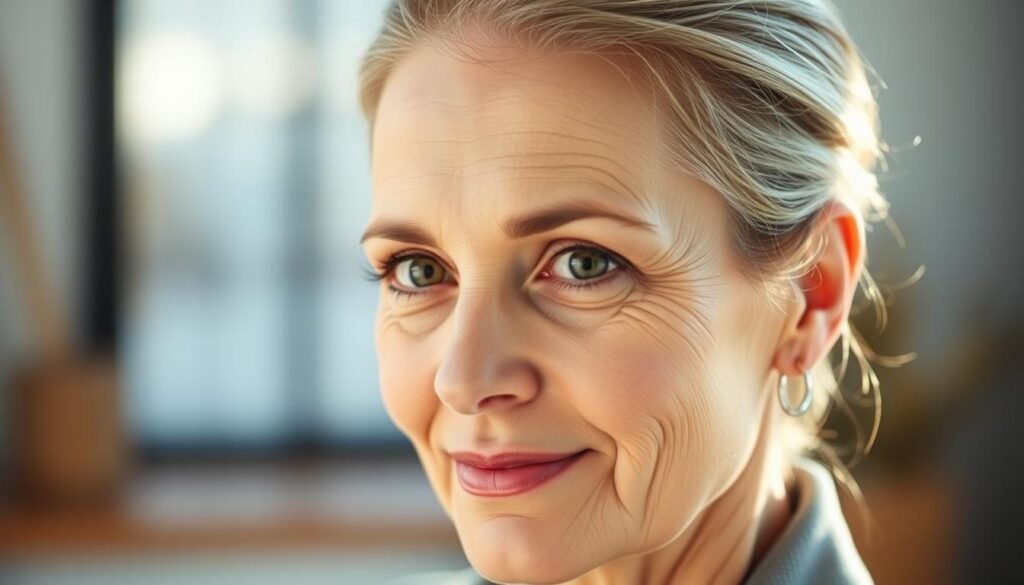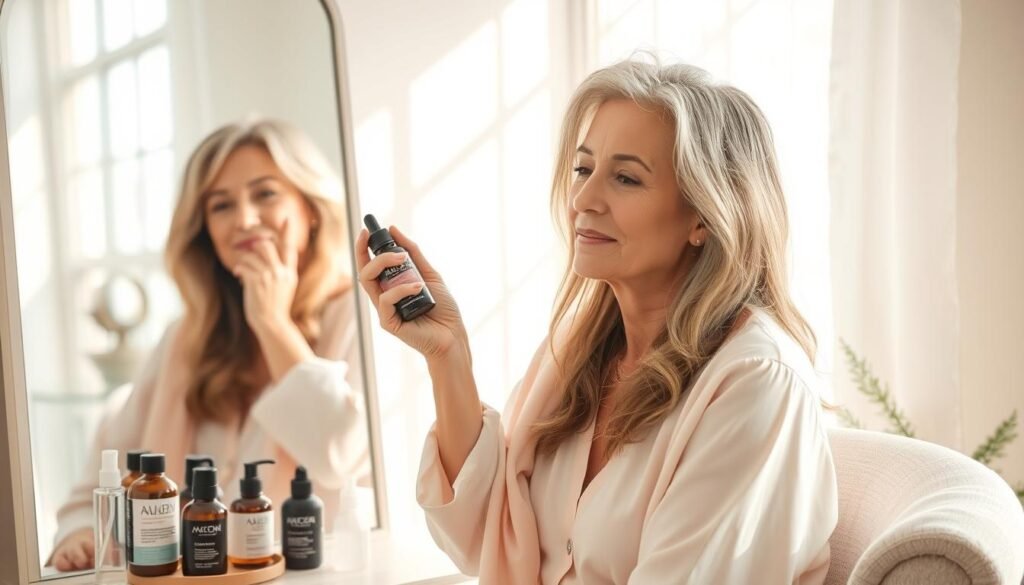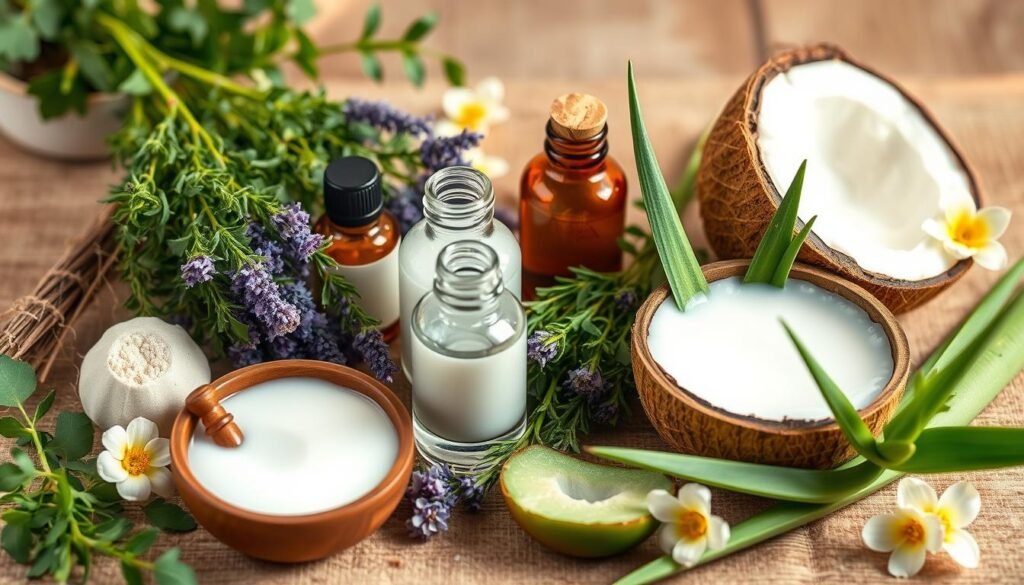Did you know many studies show more than half of all females will face menopause-related hair thinning or loss? This is a common yet rarely discussed issue. For a lot of women over 40, hair loss is not just physical but also an emotional struggle. It leads to insecurity and anxiety. Understanding this problem means looking at the body’s changes and finding effective older women’s hair loss treatments.
In this article, we offer detailed hair care advice for those facing these challenges. We’ll talk about how to cope, treatment options, and support systems to help women feel confident again. This could mean trying topical treatments like minoxidil or changing lifestyle habits. Our mission is to find real solutions that improve hair health and self-esteem. For more support, please check out this resource.
Key Takeaways
- Hair loss affects over half of women during menopause.
- Understanding hormonal changes is crucial for managing hair loss.
- Topical treatments like minoxidil can promote hair regrowth.
- A balanced diet rich in nutrients supports hair health.
- Stress management plays a vital role in minimizing hair loss.
- Seeking medical advice can help identify underlying conditions.
Understanding Hair Loss in Women Over 40
Hair loss in women over 40 is not just about getting older. It’s more than looks. Significance of hair loss can point to health problems and affect how a person feels. Many women see their hair get thinner or start losing patches as they near menopause. This can really hurt how they see themselves.
It’s normal to lose 50 to 100 hairs a day. But when you start seeing more hair fall, it can be worrying. Knowing the emotional effects of hair loss can make women feel less alone. Hormones, genes, and not having enough nutrients can also lead to losing hair.
If you want to understand more about why this happens and what you can do, there’s a lot of info at this link. It’s a place where women can find help and feel powerful about their hair health.
Identifying the Symptoms of Hair Loss
For women over 40, it’s crucial to understand hair loss symptoms. Many observe their hair thinning, which slowly gets worse. It’s key to note signs like:
- Increased hair shedding: Losing over 100 hairs daily is not a good sign.
- Hair thinning at the top of the head or temples.
- Developing bald spots or wider partings.
Women noticing these signs should consult a dermatologist. A skin doctor can spot what’s wrong and see if treatments like minoxidil will work. Acting early on these issues could make treatments more effective.
Changing hair should not be ignored by women. Spotting the signs early could mean better chances of reversing hair loss. Since many things can cause more hair to shed, it’s vital to investigate these signs.
Common Causes of Hair Loss in Women Over 40
Understanding what leads to hair loss can guide women to find answers. A few key things cause hair issues for women past 40. These include hormone changes, stress, and not getting enough nutrients. How these affect hair may differ from person to person.
Hormonal Changes and Hair Loss
When women hit their 40s, they often face hormonal shifts because of menopause. This can result in more hair thinning and bald patches. Research shows that lower estrogen levels play a part in female pattern hair loss. This problem usually shows up in midlife and continues getting worse. Tackling hormonal changes through lifestyle changes or medical help can lessen hair loss.
The Role of Stress in Hair Loss
Stress has a big impact on hair health. It leads to telogen effluvium, a condition where you lose a lot of hair due to stress. This can mean losing up to 300 strands a day after a stressful event. Learning how to manage stress, like through meditation or exercise, can help keep hair healthy and improve your life.
Nutritional Deficiencies
Having the right nutrients is crucial for keeping hair strong. Missing out on important vitamins, like iron and vitamin D, can hurt hair health. Women over 40 need to eat well, with plenty of nutrients, to help hair grow and stop it from falling out. It’s smart to think about supplements, but talk to a doctor first for advice.
Types of Hair Loss Affecting Women Over 40
For women over 40, knowing the types of hair loss is key. The main kinds are female pattern baldness and alopecia in older women. Each type impacts hair health differently and needs its own approach to treatment.
Female Pattern Baldness
Female pattern baldness, or androgenetic alopecia, is a big cause of hair loss. It affects more than half of women by the age of 80. It often starts in a woman’s 40s, 50s, or 60s. Signs include thinning hair across the top of the head but the front stays normal. By 50, 40% of women see their hair getting thinner because of this.
This hair loss happens when hair follicles shrink over time. Women with this condition have more hair falling out and less growing. This leads to less hair coverage and more thinning as time goes on.
Alopecia in Older Women
Alopecia includes different hair loss types, like alopecia areata, an autoimmune condition. It causes sudden loss of hair in spots and can happen at any age. But, it poses special challenges for older women. It may also happen together with female pattern baldness, making hair loss more complex.
Female pattern baldness and alopecia are different, so they need different treatments. Women can then address their hair loss properly with the right care.

Treatments for Hair Loss in Older Women
Hair loss in older women is tough but many options exist to help. They range from prescription medications to natural methods. Knowing about these treatments enables women to choose wisely for their hair health.
Prescription Medications
Minoxidil is a prescription medicine that the FDA approves for hair loss. It works well against androgenetic alopecia. Users see good results with both 2% and 5% solutions. Adding low-level light therapy can boost its effectiveness.
Spironolactone balances hormones to prevent hair loss. Ketoconazole can make hair stronger by lowering inflammation. If you have alopecia areata, corticosteroid shots might help your hair grow back.
When simpler treatments don’t work, hair transplantation or platelet-rich plasma injections might be the next steps. These can greatly enhance hair thickness and scalp health.
Natural Remedies for Hair Loss
Natural remedies are also worth considering for hair loss. Eating right and getting enough vitamins like iron, biotin, and zinc is important. A scalp massage can improve blood flow, encouraging hair to grow.
- Herbal supplements like saw palmetto and ginseng may reduce hair thinning.
- Essential oils, such as rosemary and lavender, are known to help the scalp.
- Drinking plenty of water and eating a balanced diet strengthens hair.
Women over 40 often struggle with hair loss due to changes like menopause. By looking into both medical and natural solutions, they can find effective ways to manage their hair loss.
Managing Hair Loss Effectively
For women over 40, managing hair loss can be tough. A careful plan makes a big difference. A gentle hair care routine helps avoid more loss. It’s also key to understand how losing hair affects emotions. Many women find this time hard. So, getting emotional support is critical for their well-being.
Hair Care Routine Recommendations
Choosing the right hair care tips is important to handle hair loss. A gentle hair care method helps stop more damage and thinning. Here are some tips to follow:
- Use sulfate-free shampoos and conditioners to minimize irritation.
- Avoid excessive heat styling tools; opt for air drying instead.
- Incorporate nourishing oils like jojoba or argan oil to hydrate hair.
- Limit tight hairstyles that can lead to traction alopecia.
- Focus on a balanced diet rich in vitamins and minerals that promote healthy hair.
Self-Confidence and Emotional Support
The emotional side of hair loss impacts many women. Learning to accept oneself is key to staying confident. Talking with close friends, family, or support groups offers important emotional backing. Discussing hair loss helps share experiences and ways to deal, helping women face this challenge with strength and grace.

Preventing Hair Loss in Women Over 40
To stop hair loss for women over 40, understanding how lifestyle impacts hair is key. Eating well helps keep hair thick and stops further loss. Vitamins like B12 and iron are crucial for hair growth.
Exercise regularly to manage stress, as it can cause hair to fall out. Activities like yoga or simple workouts can improve your mood. This makes your hair healthier.
Steer clear of harsh hair treatments and very tight hairstyles. Choose mild hair care products and styles that protect. These hair loss prevention strategies help keep hair strong during this time in life.
Table of Hair Loss Prevention Strategies
| Strategy | Description |
|---|---|
| Balanced Diet | Include vitamins like B12 and iron for healthy hair growth. |
| Regular Exercise | Aids in stress management, promoting emotional well-being. |
| Gentle Hair Care | Avoid harsh treatments and tight hairstyles to protect hair. |
| Stress Reduction Techniques | Incorporate yoga and meditation to reduce hair shedding triggers. |
| Consultation with Professionals | Seek advice from a dermatologist for personalized hair care. |
Using these strategies helps women over 40 prevent hair loss. It keeps hair full and vibrant as they get older. Taking care of hair boosts confidence and lessens the worry about losing hair.
Natural Remedies for Hair Loss in Older Women
Older women often look for effective hair loss solutions. These solutions help keep their confidence up. Natural remedies are key in fighting hair thinning and boosting hair growth. They mix diet advice and holistic methods. This improves hair health and well-being.
Dietary Tips for Healthy Hair
Nourished, vibrant hair starts with a balanced diet. It’s vital to eat foods rich in protein because hair follicles need it. Good choices are:
- Low-fat red meat
- Green leafy vegetables
- Eggs
- Fatty fish
- Berries
- Avocados
- Daily multivitamins
Drinking enough water is just as crucial. It helps all body functions, including growing healthy hair. Try to drink eight glasses a day. Adding foods rich in essential fatty acids, like salmon and nuts, boosts hair health even more.
Holistic Approaches to Hair Health
Natural remedies can really help your hair grow. Some great options are:
- Coconut oil – It’s great for moisturizing your hair
- Rosemary oil – Might work as well as some drugs
- Peppermint oil – Boosts blood flow to your scalp
- Red ginseng – Showed good results in studies on animals
- Onion juice – Its sulfur helps make your hair strong and moist
Massaging your scalp can also help by boosting circulation. This helps your hair get thicker by benefiting the follicles. Reducing stress with meditation or yoga helps your hair from a holistic standpoint.

| Natural Remedy | Benefit |
|---|---|
| Coconut Oil | Moisturizes and reduces protein loss |
| Rosemary Oil | Promotes hair growth effectively |
| Peppermint Oil | Stimulates hair follicles by increasing blood flow |
| Red Ginseng | Supports hair growth in active follicles |
| Onion Juice | Strengthens hair and reduces inflammation |
By following these dietary tips and natural remedies, older women can actively enhance their hair health. Adopting these methods marks a significant step in their hair care journey.
Hair Restoration Options and When to Consider Them
Exploring hair restoration can offer hope to women with thinning hair or bald spots. Nearly one-third of women nearing menopause go through these changes. It’s essential to understand both surgical and non-surgical methods. Doing so can help in regaining lost confidence. Hair transplants and low-level laser therapy are gaining popularity as solutions.
Hair Transplants and Cosmetic Procedures
Hair transplants are a surgical solution for noticeable hair loss. They work by moving hair from denser areas to thin spots. This can provide lasting results. Many women with female pattern baldness consider this option. It affects about 40 percent of middle-aged women. For many, it’s a game-changer, offering a fuller look and boosting self-esteem.
The Effectiveness of Low-Level Laser Therapy
Low-level laser therapy has become well-known for treating hair loss effectively. It’s an FDA-cleared method that uses red light therapy to wake up hair follicles. As a non-invasive approach, it’s ideal for those avoiding surgery. Research shows it can make hair denser and thicker. This is great news for women facing the stress of hair loss.
Conclusion
Hair loss in women over 40 is common. It’s often caused by hormonal changes, stress, and not getting enough nutrients. Knowing about hair loss helps women take steps to keep their hair healthy. It’s important to tackle hair loss head-on. This can range from changing your lifestyle to getting professional help if needed.
Eating right plays a huge role in combating hair loss. Not having enough iron, zinc, and vitamins can stop hair from growing. A diet full of important nutrients can help fight against hair becoming thin and falling out. It’s also key to handle stress and environmental factors that harm hair health.
Getting help early is critical. You can look for medical treatments, eat better, or try treatments like low-level laser therapy. For more noticeable results, options like Follicular Unit Extraction (FUE) or Follicular Unit Transplantation (FUT) can increase hair thickness. Success stories show that effective hair restoration can change lives. For more on beating hair loss, check out nutritional strategies for healthy hair. It provides useful tips for this journey.